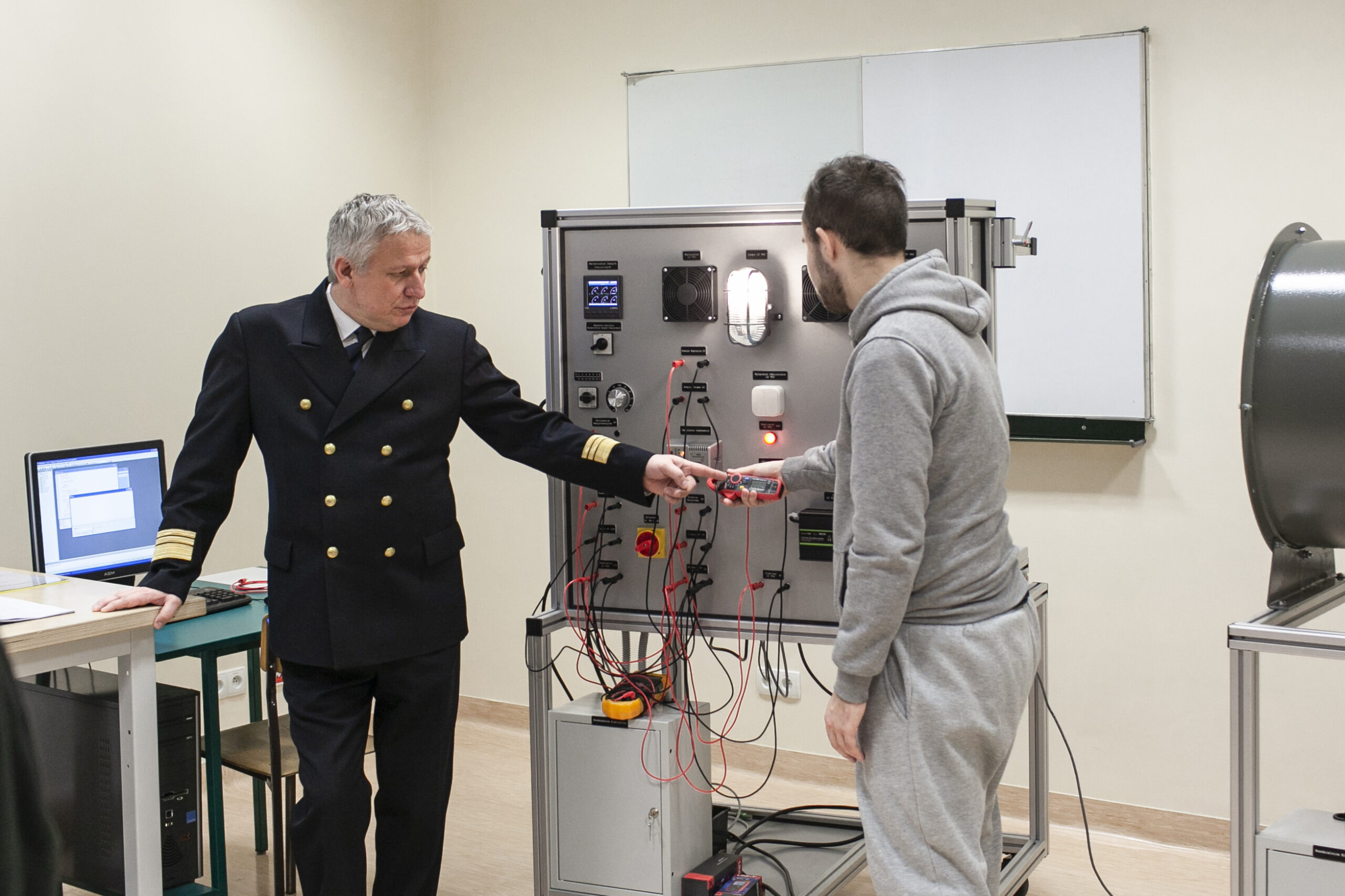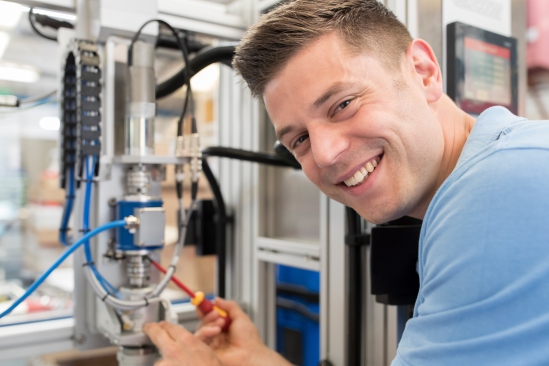GENERAL INFO
Automation and Robotics
Faculty: Faculty of Mechatronics and Electrical Engineering
Type of studies: Undergraduate
Language: Polish
Duration: 4 years
Mode: Full-time studies
Degree: Engineer
Admission dates: 19 May 2025 – 15 September 2025
Automation and Robotics
Automation and Robotics is the future of modern industry, smart systems, and intelligent machines. This degree equips students with knowledge in control systems, industrial automation, robotics, electronics, and programming. It combines engineering theory with practical training in state-of-the-art laboratories.
At the Maritime University of Szczecin, students learn how to design, implement, and maintain automated systems used in industry, transport, energy, and maritime sectors.
Duration of studies:
4 years (8 semesters), including 22 weeks of professional internships.
Specialization
The curriculum includes theoretical and practical courses focused on the design, programming, and diagnostics of automation and robotics systems.
Graduates obtain the title of engineer, preparing them for careers in rapidly developing sectors related to automation and robotics in industry.
Graduate profile:
Graduates of the programme are well-prepared to work as automation engineers, robotics specialists, system designers, or maintenance engineers in both land-based industries and the maritime sector. With strong technical and analytical skills, they can solve complex engineering problems and contribute to innovation in smart technologies and process automation.
Why is it worth it?
You will gain hands-on experience using modern automation and robotic equipment, and study under the guidance of experienced academic staff connected to the industry. The programme combines engineering with digital technologies, ensuring you’re ready for careers in Industry 4.0. Internships, practical projects, and the possibility of international training will give you a strong start to a global career.
Employment opportunities:
Engineers in companies specializing in automation and robotics.
Specialists in the intelligent factory sector.
Employees in R&D (Research and Development) departments.
Designers of automation and robotics systems.
Studying at the Maritime University also offers a great opportunity to advance your career in modern technologies and innovations in the field of automation and robotics.
Entry requirements
Meeting the following basic criteria is obligatory for all applicants:
Legal basis for admissions of international candidates: MUS Rector’s Order No 35/2025 on detailed conditions, procedure and date of commencement and termination of international admissions in the academic year 2025/2026 (document in Polish language).
If you have any questions, check our FAQ – your question may have already been answered there.
Application step by step
Complete the online application form in our admission application system.
But before you start to fill it in, you need to prepare:
DOCUMENTS: Attach the application documents in your candidate account in the application system: click on ‘My applications’ and then on the ATTACHMENTS icon.
You are now able to upload scans of your application documents in the appropriate places.
In this section there are also documents that require your handwritten signature (eg. your admission request). You must first download such documents, print them out, sign them and then scan and upload them in the appropriate places of this section.
GRADES: You must then complete your grades in the admission system. Click on “My applications” and then on the “Add grades” icon.
APPLICATION FEE: The application fee is PLN 85, i.e. about EUR 20. It is best to pay it online in your candidate account in the application system (in the section: APPLICATION FEE). If you however decide to make a traditional bank transfer, please use the details below:
Account owner / recipient: Politechnika Morska w Szczecinie (Maritime University of Szczecin)
Address – first line: ul. Wały Chrobrego 1-2
Address – second line: 70-500 Szczecin, Polska (Poland)
Name of the bank: Bank Pekao SA VII O/Szczecin
Bank account number: 91 1240 3927 1111 0011 0575 2658
IBAN: PL91124039271111001105752658
SWIFT: PKOPPLPW
Transfer reference: „Application fee Your name and surname”
If you are applying for admission to a Bachelor’s degree programme and you completed your secondary education in a country other than a member state of the European Union, OECD, EFTA, Ukraine, China your admission will only be possible if you meet all of the following conditions:
1. all the required application documents have been submitted
2. a document certifying your proficiency of the language of instruction at B2 level: Polish or English has been submitted
3. you have successfully passed ENTRANCE EXAM to our university
4. your secondary education qualification has been formally recognised by the Polish National Agency for Academic Exchange in Warsaw (more information HERE)
Once your application is granted the status: “Qualified for admission“, the final step of the admission application is to deliver your original application documents to the Maritime University of Szczecin. You will be given precise information from us about the date by which the documents should arrive at our University.
In addition to submitting the originals of all documents previously attached as scans, you will be required to provide 2 pieces of your photograph and produce your passport.
If you choose to send us your documents by post/courier please use the following address:
Politechnika Morska w Szczecinie (Maritime University of Szczecin)
Department for Admissions and International Affairs
ul. Wały Chrobrego 1-2
70-500 Szczecin
POLSKA (Poland)
Questions? we are available at: international@pm.szczecin.pl
Language requirements
To study in the Maritime University of Szczecin you are required to know Polish or English language at B2 level (for programmes with Polish or English language as the language of instruction respectively).
OFFICIAL DOCUMENTS:
Fees and tuitions
Annual fees:
All tuition and study payments at the Maritime University of Szczecin should be paid in PLN. The below PDF files contain all detailed information about tuition fees (per year) for degree programmes offered in Polish and English language at the Maritime University of Szczecin (MUS).
Studying in English language
Currently, Maritime University of Szczecin delivers only few degree courses in English language (they are highlighted in the above PDF file). Please, pay attention to the fact that the price for EU citizens and holders of the Polish Card is greatly reduced as they are treated equally with Polish citizens. Foreigners from outside the European Union who are not holders of the Polish Card have to pay the full tuition fee.
Additional costs for students of the seagoing programs
Students of Navigation, Mechanical Engineering, Mechatronics and Inland Shipping have to pay extra for International Medical Certificate for service at Sea: approx. PLN 400 (approx. EUR 90) which is valid for 1 or 2 years depending on the doctor’s decision, and for the Seaman’s registration book: EUR 50 which is a one-time fee. These fees are paid in external institutions, i.e. a medical clinic and the Maritime Office in Szczecin.
Studying in Polish language
Basically, foreign students studying in Poland in Polish language need to pay for their education. However, there are exceptions that exempt from tuition fees the following groups of foreigners studying full-time programmes
If you do not belong to one of these groups, you will have to pay for studying at MUS. However, the tuition fees charged by the Maritime University are not high. MUS is a state university which means that, similarly to non-profit organisations, its offer is not strictly commercial.
The annual fees charged by our University depend on the programme (sea-going programmes are more expensive than other, non-sea-going degree courses), the level of study (the undergraduate level is usually more expensive than graduate level as it takes 7 to 8 semesters, whereas graduate level takes only 3 to 4 semesters) and the mode of study (you always have to pay for the part-time programmes but the annual tuition fee depends on your status).
Admission options – check your status
For whom?
All other foreigners not listed in the section above.
If you are Polish, click here

